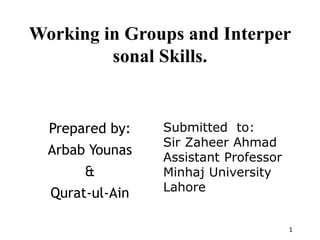
Presentation on Working in groups and Interpersonal Skills Final for Presenting.pptx
- 1. 1 Prepared by: Arbab Younas & Qurat-ul-Ain Working in Groups and Interper sonal Skills. Submitted to: Sir Zaheer Ahmad Assistant Professor Minhaj University Lahore
- 3. 3 Interpersonal skills Necessary for relating and working with others Effective communication skills – listening and expressing Ability to give and receive feedback Being able to work well in teams or groups
- 4. 4 Benefits Personal relationships Professional relationships Employment related skill Team or group work in college Learn about other perspective s Share work load
- 5. Interpersonal skills include: 1. Communication skills: Following communication skills are included in interpersonal skills: a. Verbal Communication: what we say and how we say it; b. Non-Verbal Communication: what we communicate without words, for example through body language, or tone of voice; and c. Listening Skills: how to interpret both the verbal and non-verbal messages sent by others. 5
- 6. 6 Interpersonal skills include: 2. Emotional Intelligence being able to understand and manage your own and others’ emotions. 3. Working in Groups being able to work with others in groups and te ams, both formal and informal. 4. Negotiation, Persuasion and Influencing skills working with others to find a mutually agreeable outcome. This may be considered a s ubset of communication, but it is often treated separately.
- 7. Interpersonal skills include: 5. Conflict resolution and mediation: working with others to resolve interpersonal conflict and disagreements in a positive way, which again may be considered a subset of communication. 6. Problem solving and decision-making: working with others to identify, define and solve problems, which includes making decisions about the best course of action. 7
- 9. Working in Groups. 9 Group work is a common situation, both at home and at work, giving you plenty of opportunities to work on the skills. It may be helpful to understand more about group dynamics and ways of working, as these can aff ect how both you and others behave. Conventionally a cademics, communication, and management theorists use the terms: group, group-working, group-interactio n, group structure, etc. to refer to the dynamics of people working together towards a common cause.
- 10. Working in Groups includes: 10 1. People who can identify with each other. 2.Sharing ideas, beliefs, and experiences of common areas. 3.People who frequently and regularly engage with each other, agreeing on a purpose and working together on shared tasks 4. People who recognize themselves and are recognized by others as part of a group.
- 11. 11 Benefits of learning in groups Experience, skills or knowledge of others Support, encouragement, responsibility Share work Increase understanding Differing perspectives Others?
- 12. 12 What is a group? A group is a collection of individuals who come to gether for a particular reason or with a common aim.
- 13. 13 What is a group? Task elements Goals, Resources, Skills, Decisions Process elements Roles, Communication, Dynamics, C onflict Resolution
- 14. 14 What is group dynamics? Group dynamics examines the way people behave in groups and attempts to understand the factors that make a group more effective.
- 15. 15 To be effective groups need to: Achieve a task Build and maintain the group Develop / help individuals
- 16. 16 Effective groups: Clear, relevant goals Open communication Cooperation Members responsible for own behavior Processes for decisions established Problems confronted openly Conflict resolved constructively
- 17. 17 Groups need to be “nurtured” What does this mean?
- 18. Characteristics of Working in Groups: Following traits are related to working in groups which are linked with Interpersonal skills: 1. Sharpness drives work forward and get things done, has a clear idea of the desired direction of travel. 2. Implementation related to getting things done, looking for ways to turn talk into action and generate practical activity. 18
- 19. Characteristics of Working in Groups: 3. Completion focuses on completing tasks and tidying up all the loose ends. 4. Coordination manages the group dynamics, often in a leadership role. 5. Team Work intends to help the team to work effectively by supporting personal relationships. 6. Resource Investigation gathers external resources and information to help the team. 19
- 20. Characteristics of Working in Groups: 7. Planning generates ideas and creative solutions. 8. Monitoring and Evaluation related to good at critically assessing ideas and proposals, and at making decisions. 9. Technical Specialization brings expert knowledge to the group, not always necessary to effective functioning. 10.Cohesiveness is, in part, the measure of the success of the group. 20
- 21. Conclusion: People with strong interpersonal skills tend to be able to work well with other people, including in teams or groups, formally and informally. They communicate effectively with others, whether family, friends, colleagues, customers or clients. They also have better relationships at home and at work. 21
- 22. Reference: Syed, S. Z., Abiodullah, M., & Yousaf, A. (2014). Assessing emotional intelligence and interpersonal skills of university students as predictors of employability. In 21st Century Academic Forum Conference at Harvard– 2014 Official Conference Proceedings (pp. 243-255). Lopes, D. C., Gerolamo, M. C., Del Prette, Z. A. P., Musetti, M. A., & Del Prette, A. L. M. I. R. (2015). Social skills: A key factor for engineering students to develop interpersonal skills. International Journal of Engineering Education, 31(1), 405-413. Klein, C., DeRouin, R. E., & Salas, E. (2006). Uncovering workplace interpersonal skills: a review, framework, and research agenda. Interpersonal Skills Module 22
Editor's Notes
- 5
- 7
- 9
- 22